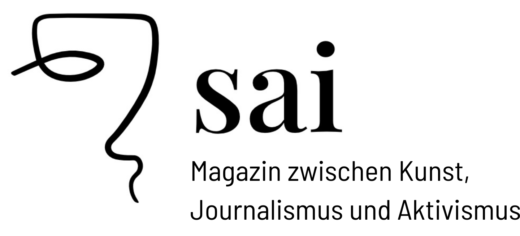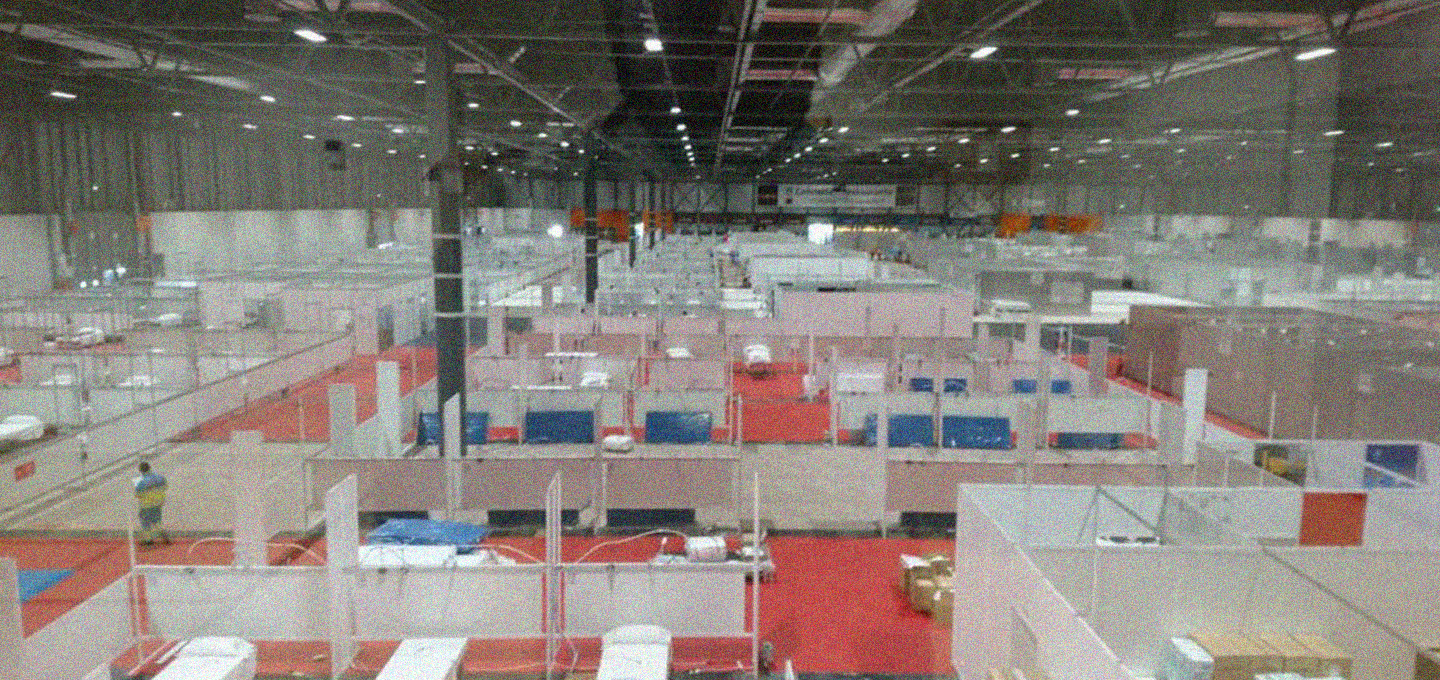Text: Mathis Gilsbach | Fotografie: Camila Elena Arranz Villalva
It is late March 2020, Spain is in Crisis. Cases of Covid-19 are rising daily but in a rapidly constructed field hospital in the South of Madrid, a group of doctors is sitting around, drinking coffee, waiting for patients.
48 hours was all it took for the IFEMA convention centre (Instituto Ferial Madrid) to be transformed by the military into a field hospital to stem the tide of the pandemic.
5000 beds on 35,000 square metres, the Spanish Anthem playing twice a day, it is a signature project of the government of Madrid, to show their vigilance in the fight against the virus.

The wide halls are filled with beds, separated only by flimsy dividers. The lights are bright, hanging far above the scene, leaving everyone to the same rhythm of day and night as the whole hospital
This arrangement does not seem to afford a lot of privacy but it is born out of a situation of crisis.
Now, the doctors and nurses are there – all cramped together in a few offices – but it takes a lot of time until the first patients arrive.
“It was a complete disaster”
That is how Camila Elena Arranz Villalva, 29, is referring to the chaotic organisation. She knows that at the same time, her colleagues at primary care centres were working way overtime to cover her shifts.
The young doctor is angry about the chaotic situation.
Patients arrive eventually, but protective equipment is lacking and inadequate. Some doctors and nurses wear multiple layers to protect themselves when working with Covid-19 patients. According to El Pais many other medical workers share these concerns about the safety of the staff.

Camila Elena Arranz Villalva just had finished her formation as a general doctor when she found herself in the middle of the pandemic. She recalls the moment she learned that she would be working in the new hospital. Initially she and some colleagues saw the announcement on TV that this new field hospital was going to open. There were rumours they would be sent there.
Initially they did not quite believe it, it seemed so surreal.
A few days later she was at home and got a call: “Can you start working tomorrow?”, they asked her and she recalls her thoughts racing “Oh my god, what is happening”.
That night she did not sleep much.
She remembers walking around the house asking herself “what have you done, why did you accept this job? What are you going to do, you don’t know anything.”
All of a sudden the situation got very real.
“Suddenly I felt as if I was going into Corona.”
It was not so much the fear of getting infected that kept her up, it was the idea of having all the responsibility and the fear of not knowing enough to deal with this new illness. She thought that she may not be qualified enough to treat the patients. She did not know what was expected of her. What would she do if she was confronted with a severe case and nobody else to ask.
“I have worked in a hospital during my residency but I never had the whole responsibility.”
When she went to the hospital the next day nothing happened. It took three more days before she saw her first patients.

When work started for real, she says that it was really chaotic but also good because she felt a true connection with the other doctors and nurses from her group. They were all young doctors with a lot of energy to work and find solutions to solve the mess they were presented with.
They coordinated and helped each other constantly exchanging new insights and ideas about the situation and the virus. She still is in contact with the group via WhatsApp to exchange information about the newest developments and to generally keep in touch.
Everyday the Spanish Anthem was playing in the morning and afternoon.
Arranz-Villalva felt unwillingly used by the government for propaganda. Playing the anthem in a hospital is not at all normal in Spain because for many it is connected with the fascist Franco regime, that ruled Spain until 1975.
“It was disgusting how they were using the hospital for right-wing propaganda. Besides, I am working and I don’t want to listen to music, I am working with patients.”
She felt that many patients, as well were uncomfortable with the situation. Quite a few of them were older people that had suffered under the dictatorship or lost their relatives during the civil war. It was absurd.
She was happy to work with the patients and proud of her colleagues but at the same time disgusted to be used for a political stunt by the government of Madrid. This becomes more clear in comparison to other hospitals, which had less equipment and less doctors for more patients. At IFEMA one doctor was responsible for ten patients, while in other medical facilities, the ratio was one to thirty and the staff was overwhelmed.
Generally the doctors simply focused on their work and on their patients who needed them. Even though they were aware of the propaganda, they could not really leave their patients or strike to protest.
On a personal level the whole situation has been a great learning situation for her. She and her group have even been recognised as the best team by their superiors.
Talking to her it becomes obvious how much she cares for her patients. She smiles and lights up as she talks about them and working with them.
She still remembers Florencio. With a warm smile she describes him as “an old, very polite man.” He had to stay at the hospital for over a month and had a really weak heartbeat that scared Arranz-Villalva.
“I literally was so frightened by that heart, I thought it was going to stop any minute.”
Despite his serious condition she remembers how Florencio was always very neatly dressed, reading his newspaper in the early morning just before the first doctors visit. “And that with such a low rate of oxygen in his heart,” she recalls. He always greeted her very nicely, saying: “Oh I feel alright, a bit tired but I feel alright.”
They fought for his health for over a month. In the end he could go home and recovered.
Stories like this remind her that the human body is a miracle. “I admire the ability of the body to fight for life, to fight to be cured.” she says and that we should be thankful for it and take good care of it.
Even though the infections are increasing, the IFEMA has not yet reopened. Arranz-Villalva decided to reduce her hours in a primary care centre to pursue her dream of studying at a theatre school.

